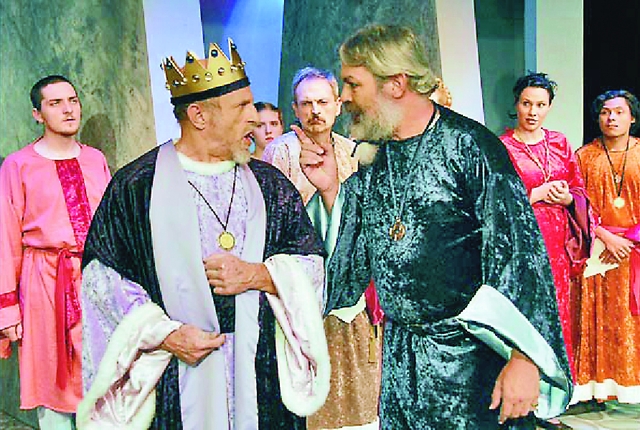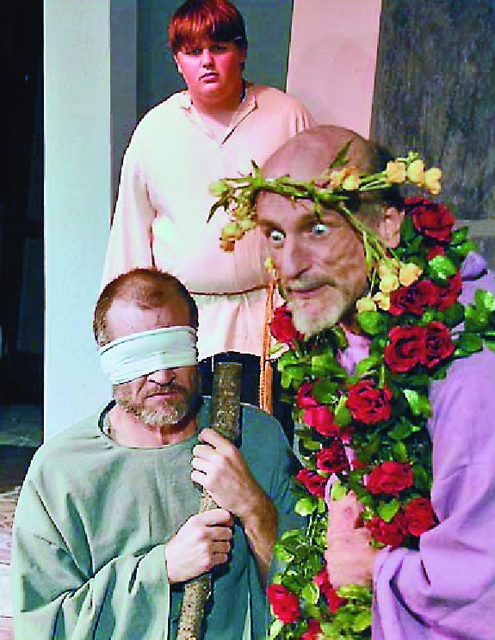After having his eyeballs gouged out by the Earl of Cornwall, the Earl of Gloucester utters one of the most memorable lines in King Lear: “As flies to wanton boys are we to the gods; They kill us for their sport.” Given the compounded misery stuffed into this gruesome play, you might think that’s the lesson here. You’d be wrong.
Shakespeare, as usual, is smarter than that. Bad luck—an alternate term for “vengeful gods”—plays a starring role in most of human existence, but bad decision-making plays an even bigger one. You might feel sad for poor ol’ Gloucester, but you’d be forgetting how quickly he believed the worst about his loyal son, Edgar.
You’ll certainly also feel some pity for King Lear, since he suffers a parallel fate just as horrific. In that case, too, though, Lear banished his honest youngest child, Cordelia, from his kingdom in favor of his scheming elder daughters. Poor judgment, to say the least. Lear lost control of his own life and kingdom not because the gods saw fit to torture him, but because he made a whole bunch of really dumb choices. He was also vain. And selfish. And simply out of touch. No small irony that his own Fool is the one person in the play wise enough to point his idiocy out to him.
A new production of Shakespeare’s great tragedy is playing at the
Adobe Theater through the beginning of September. Helmed by veteran director Ralph Adkins, the show has plenty of flaws, but it largely succeeds in spite of them.
This Adobe performance concludes the first annual
Albuquerque Shakespeare Festival, a multi-venue, multi-troupe Shakespeare series that began last January with
Romeo and Juliet at the Albuquerque Little Theatre.Set in ancient England, the basic story is simple. King Lear is an absolute monarch who has grown accustomed to having his royal butt kissed by his underlings. Utterly divorced from reality, he decides he’s going to split his kingdom into three parts and bestow them on each of his three daughters. Before he does this, he concocts a simpleminded test to determine whether they’re worthy of his generous gift: He asks each of them to give a speech about how much they love him.Yuck, right? His eldest daughters, Goneril and Regan, spread it on thick, telling him exactly what he wants to hear. His youngest daughter, Cordelia, clearly the only sincere one of the bunch, decides to avoid her father’s superficial game altogether. Lear flips and boots her out of the country. He divides his kingdom in half for Goneril and Regan. Predictably, they both immediately betray him.Lear learns a tough lesson about loyalty. In his bleakest hour, his true friends come to his aid, and the empty flatterers reveal their sinister hearts. The king goes crazy. He wanders around in the wilderness. He learns some valuable lessons. Eventually, since this is a Shakespearean tragedy, almost everyone—villains, fools and heroes alike—ends up dead. King Lear is an immensely complicated play, and Adkins has cast several of his Albuquerque High drama students in secondary roles. With this in mind, you can’t expect the show to be rock solid from start to finish, and it isn’t.I did enjoy it, though. Yes, as King Lear Ron Elguera probably should have toned down a couple of his more wrenching scenes, but most of the time he looks and acts the part well. Also, the Birkenstocks-with-socks look is really only suitable around the house. It’s a little distracting here. That said, the simple set and multicolored velour costumes are perfectly adequate for the task at hand.There were several fine performances in the show—Nicolette Brown as Cordelia, Ernest W. Sturdevant as the Earl of Gloucester—but the one that really stood out for me was Owen Callis as Edgar. Callis showed an impressive feel for the language. His performance was sometimes moving, sometimes hilarious, sometimes just entertainingly bizarre. He owned every scene he was in.This is community theater, and the production has some of the roughness you’d expect from a volunteer cast. Still, Adkins and company did admirable work exploring some of the subtleties of this heartbreaking story about loyalty, betrayal, authority and wisdom. Plus, the play features both a fog machine and some decent choreographed fighting. What more can you want?










